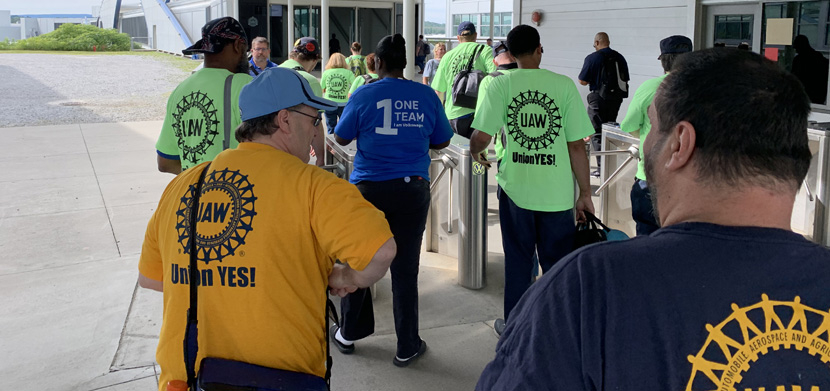Beware of the 'Easy' Way

UAW counted on a speedy election instead of arming workers to fight. Photo: Chris Brooks.
The sad outcome of the United Auto Workers campaign at Volkswagen reminded me of when I entered the labor movement 15 years ago.
Back then the national leaders of the Service Employees (SEIU) had diagnosed labor’s big problem: we weren’t organizing fast enough. As the percentage of unionized workers in the U.S. slipped, so did unions’ influence.
If only we could regain sufficient union density, these leaders said, we would have power. Then we could start winning gains for members and change the political climate.
Their strategy to organize faster was to lower the bar—convince bosses to stay neutral, so that workers could win union recognition without a fight. Often this neutrality was bought by giving up rights and benefits in advance.
But I always wondered, if you won a union without building enough workplace power to fight your boss, how much would you really be able to win going forward? And would workers want to join such a weak organization?
Since then bosses have mostly lost interest in neutrality. Unfortunately, unions haven’t lost interest in shortcuts. The UAW counted on a speedy election instead of arming workers to fight.
MOUNTAINS TO CLIMB
As an organizer helping nursing home and hospital workers unionize, I learned that power doesn’t come from an election. It comes from organizing.
That means building a committee of activists who can lead their co-workers in collective action. It means asking co-workers to support the union publicly, even when they’re scared and uncomfortable.
A good example is a group of Los Angeles hotel workers I wrote about in 2016. They faced tactics similar to Volkswagen’s—one-on-one and group anti-union meetings.
The workers marched on their boss repeatedly to defend their right to organize and to demand solutions to health and safety problems.
When it was time for the election, the boss tried one last intimidation tactic—telling workers individually what time to vote. Workers decided to go all together instead.

SUPPORT LABOR NOTES
BECOME A MONTHLY DONOR
Give $10 a month or more and get our "Fight the Boss, Build the Union" T-shirt.
They won, and came out ready for the next fight, confident in their own power.
Win or lose, an election isn’t the end. If the Volkswagen workers had won, they would have had many more mountains to climb, starting with winning a first contract. That too requires lots of action—petitions, buttons, rallies, and sometimes more.
The UAW might have lost even if it did everything right. But it would have put workers in a better position to decide what to do next.
DON’T SKIP STEP ONE
The UAW’s post-election message was that workers need better labor laws. That’s true, but it shouldn’t be the main takeaway.
It’s always appealing to put off pushing co-workers to act. “If we can just get better laws,” we tell ourselves, “or elect better politicians, or win a raise, then workers will get involved.”
Union members aren’t immune to this impulse. Those who want to improve their union may say, “First we need to get elected to leadership. Then we can start organizing people to fight for a better contract.”
But the better strategy is what Chicago teachers did. Rank and filers started fighting school closures and building a network long before their caucus ran the union.
Following their example, teacher union reformers in Denver this year became strike captains. In Baltimore, when schools were without heat, the teacher caucus organized to fix it.
Both groups of reformers ran for election this spring and won. Both are facing challenges to the election results; Denver will re-vote in the fall, and it's unclear what will happen in Baltimore. But because they’ve built organization, even if the incumbents manage to keep them out of office this round, they won’t have to start from scratch.
None of us can afford to wait on “solutions” that postpone organizing. Getting people involved is step one.






